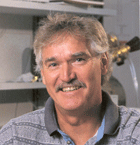
Frank Collins, George and Winfred Clark Professor of Biological Sciences and former director of the Eck Institute for Global Health at the University of Notre Dame, has been named an ambassador in Research!America’sPaul G. Rogers Society for Global Health Research. He is one of 25 experts named to the society who will advocate for greater U.S. investment in global health research.
The Rogers Society, named for the late Florida Rep. Paul G. Rogers, a renowned advocate for health research and Research!America chair emeritus, works to increase awareness of, and make the case for, greater U.S. investment in research to fight diseases that affect the world’s poorest nations.
Collins was one of the key figures in the 2002 sequencing of the genome of Anopheles gambiae, the primary mosquito species that transmits the malaria parasite Plasmodium falciparum to humans. With completion of the sequencing, scientists have the complete genetic information on an infectious organism (Plasmodium falciparum), its natural host (humans) and the insect (Anopheles gambiae) that transmits the disease from person to person.
The Collins laboratory also directs two other major malaria projects. One is a contract from the National Institutes of Health to develop and manage a Web-based bioinformatics resource center that provides scientists with access to all data related to the genomes of arthropod vectors. Management of this resource, called VectorBase, involves both developmental work in the area of bioinformatics and computer science as well as the direct analysis of genomes that are displayed and managed by VectorBase.
Collins’ other major research activity is directing the Malaria Transmission Consortium, a group of scientists at multiple research institutions who work on developing more effective ways to measure malaria transmission and use those measures to better assess the effectiveness of malaria control methods that target mosquito vectors. The project, funded by the Bill&Melinda Gates Foundation, involves field research activities in Tanzania, Kenya, Zambia and Indonesia.
Collins joined the Notre Dame faculty in 1997 after a 14-year career at the Centers for Disease Control and Prevention in Atlanta, where he was chief of the Vector Genetics Section of the Center for Parasitic Diseases. He has had his research published in a number of scholarly publications, including Science, Nature, the Proceedings of the National Academy of Sciences, Genetics and many other scientific journals. He was awarded the U.S. Public Health Service Commendation Medal in 1988 and the Public Health Outstanding Service Medal in 1993 and was elected as a fellow of the American Association for the Advancement of Science in 1997.
Collins earned his bachelor’s degree in biology from Johns Hopkins University and holds a master’s degree in English literature from the University of East Anglia in Norwich, England, and a doctorate in entomology from the University of California at Davis.
The Rogers Society was established by Research!America with funding from the Gates Foundation. Research!America works with Rogers ambassadors to maximize the effectiveness of their outreach to policy makers, opinion leaders and the media.
_ Contact: Frank Collins, George and Winfred Clark Professor of Biological Sciences, 574-631-9245,_ " frank@nd.edu ":mailto:frank@nd.edu
TopicID: 31067